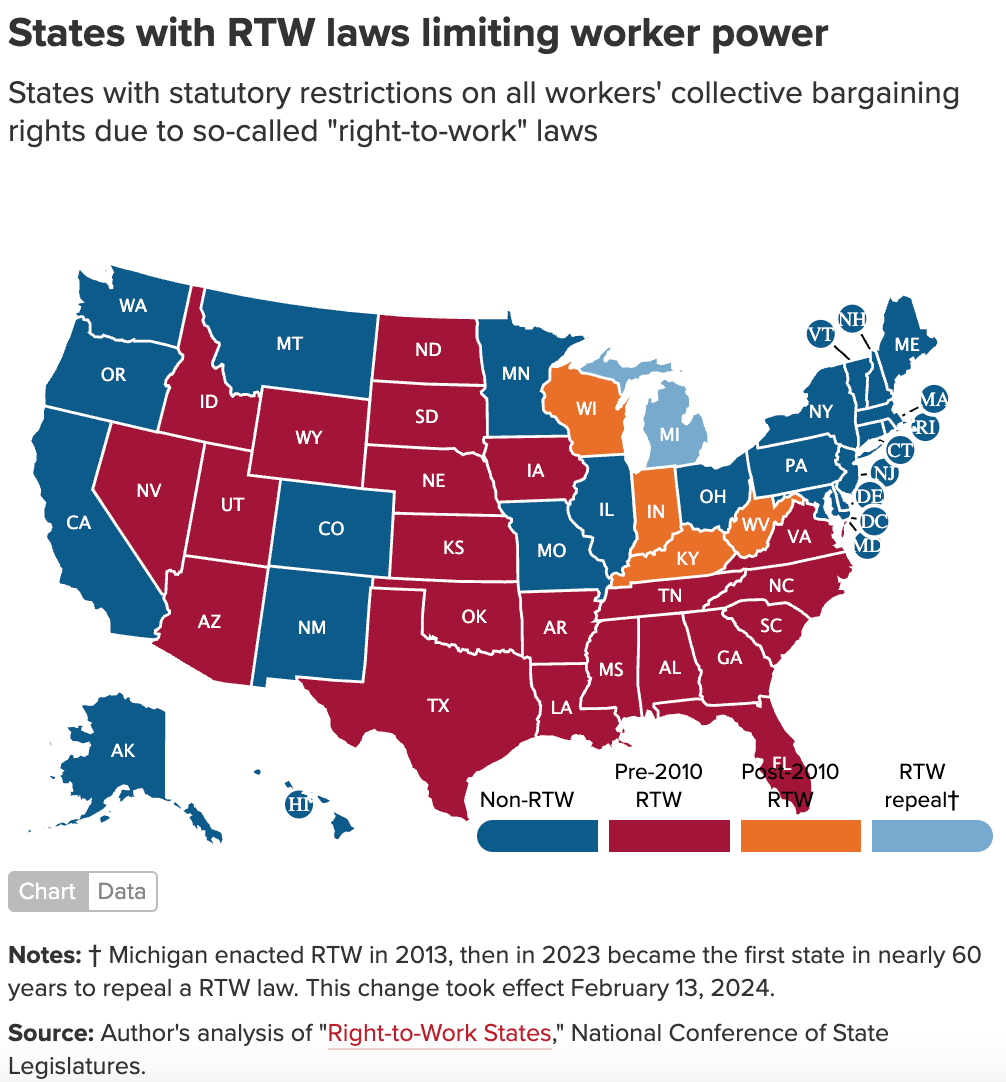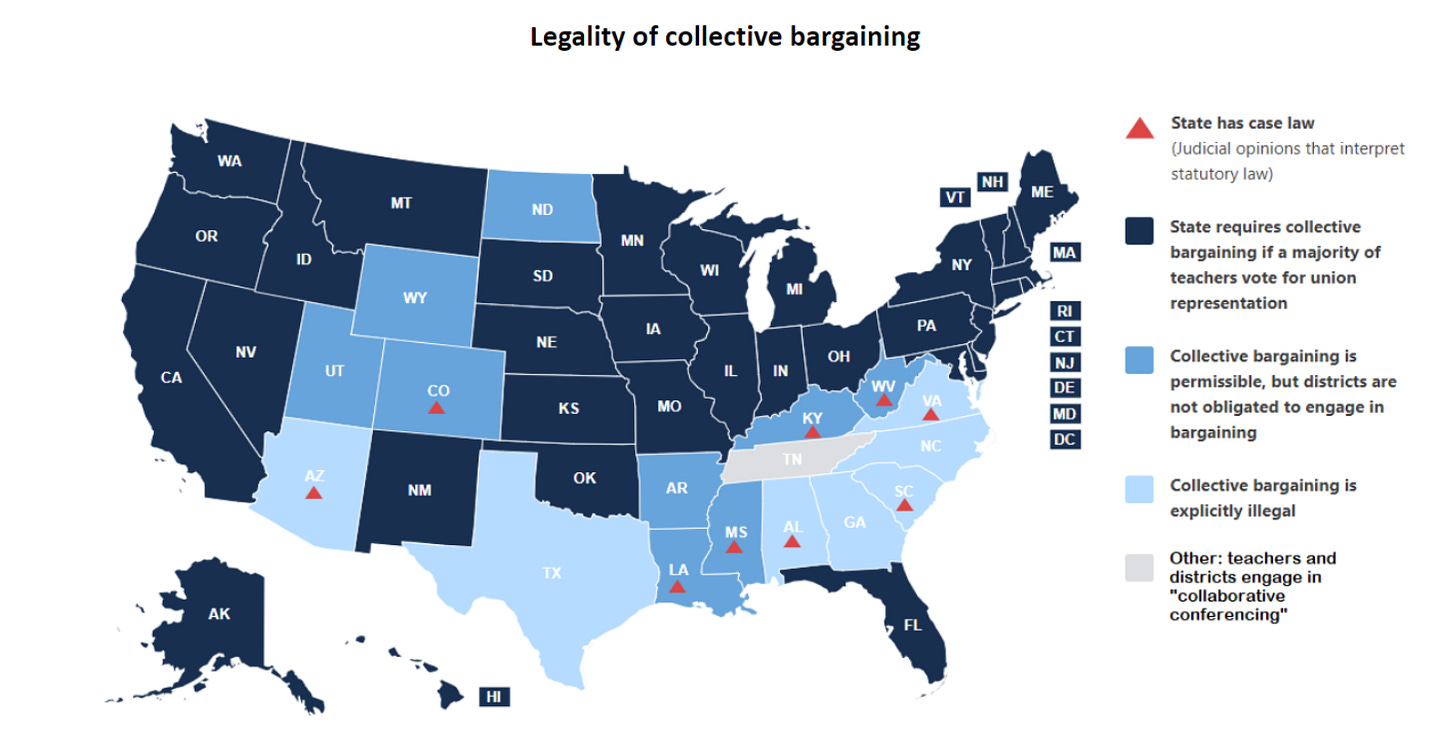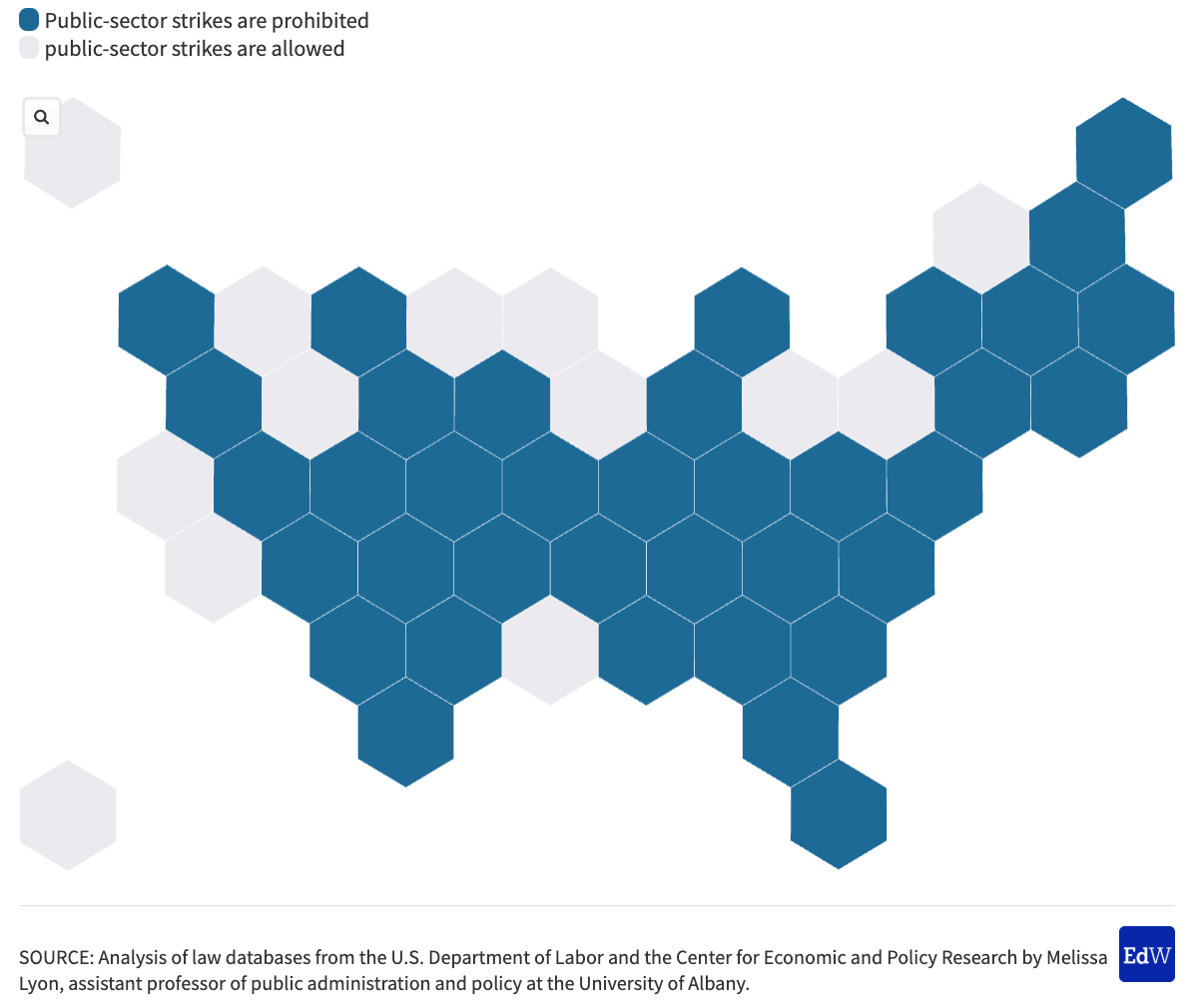Other Duties As Assigned: A Teacher’s Guide to Civic Engagement
From strikes to social media posts, let's talk about what teachers can do to stay politically engaged (without getting fired.)
Tale as old as time: You’re scrolling after a long day at school, and you see a headline that makes your jaw clench.
Maybe Moms for Liberty is up to some bullshit again. Maybe your state legislature is going along with criminalizing diversity, equity, and inclusion. Maybe the local school board meeting went off the rails.
You want to share the article. You get the urge to make a response video. At the very least, you’re itching to repost it with a caption like, “Get a load of this mess.”
But then the doubt creeps in...
“Are you allowed to post that?”
“Will my admin see?”
“What if a parent complains?”
If this is a little too real, you are probably a teacher in the year of our Lord 2025.
Like we talked about last week - education is political. It always has been. From school funding to curriculum standards, public education reflects the values and priorities of society at large.
But if you’re feeling pressure to “stay out of it,” you’re not alone. You’re also not wrong if you push back against that pressure.
Obviously, it’s way easier to wade into political waters if you are out of the profession, but the fact is: you absolutely can engage politically as a teacher!
You just need to be smart, strategic, and well-informed.
This guide is for you.
If you have questions about anything in here, you should check out your local education association, union, or an employment law attorney.
Know Where You Stand
State Specific Laws
A few years back, I learned something that was already obvious to many of you: not all teachers are operating under the same laws or protections. Educators’ rights depend heavily on where they live and work.
In right-to-work states like Texas, public employees (including teachers) are prohibited from striking or participating in anything that could even be interpreted as coordinated work stoppage - including “work-to-rule,” which is my personal favorite.
These laws stem from the 1947 Taft-Hartley Act and state-level legislation. While some legal gray areas exist (like non-union, grassroots stoppages) there is little case law offering legal protection.
Meanwhile, union-friendly states, like California and New York, maintain strong protections for teachers.
In summary…
Union-Friendly States
- Have strong protections for public sector unions
- Collective bargaining is standard practice
- Strikes could still be risky, but they are not illegal
Right-to-Work States
- Say you can’t be forced to join a union or pay union dues
- Unions have less bargaining power
- Collective bargaining may be fully banned or super limited
- Striking is often illegal, and there are severe penalties for doing it anyway (job loss, loss of pension, loss of civil service rights, etc.)

And laws are changing fast in 2025!
Recent legislation has started chipping away at union protections for educators. Lawmakers often frame these rollbacks as efforts to “give everyone a voice,” but really, they undermine the power of collective organizing.

(As of March 29th, 2025) In Utah, House Bill 267 was signed by Governor Spencer Cox and is set to take effect July 1, 2025. This bill bans collective bargaining for public unions - including teachers. It also prohibits public agencies from recognizing unions as bargaining agents or entering into contracts with them and bars unions from using public property for meetings unless they pay for it.
Violations could result in a Class B misdemeanor.
Educators say this bill is retaliation against the Utah Education Association for challenging the state's school voucher program.
In response, the Protect Utah Workers coalition is working to place a referendum on the ballot to overturn the law. They’ve already gathered nearly 130,000 signatures, and have just over 9,000 left to go before the April 14 deadline! Learn more here.
(As of March 22nd, 2025) In Ohio, Governor Mike DeWine signed Senate Bill 1, which bans public university faculty from striking and sharply limits diversity programs.
The backstory is: Republican lawmakers are using targeted legislation to try and revive Senate Bill 5 - an anti-union law that was overwhelmingly repealed by voters.
Even though Senate Bill 1’s focus is higher education, union leaders warn it’s the most serious attack on collective bargaining rights since SB5.
Scott DiMauro, president of the Ohio Education Association, says that limiting one group’s voice now sets a dangerous precedent for all public employees.
These efforts are part of a larger national trend to weaken unions. As union power goes down, so does your ability to collectively demand better pay, safer classrooms, and humane working conditions.

While many anti-strike laws are enforced, illegal strikes still occur when working conditions become unbearable.
The 2018 Red for Ed movement, walkouts in Massachusetts, and strikes in Hastings, Minnesota all show how educators take collective action even when it’s technically “forbidden.” You just gotta be smart about it and work together.
That brings me to my next point…
Know Your Rights
(Like, Really Know Them)
Straight up: there’s a lot of fear-mongering and misinformation about what teachers can and can’t do politically. But it’s tricky, because what is legal in one state could totally be illegal in another.
You’ll also need to keep a close eye on your state’s proposed bills and legislative sessions in case they are trying to squeeze things through that will erode your rights.
As a citizen, you have strong First Amendment rights. And in Pickering v. Board of Education The Supreme Court determined that teachers don’t forfeit those rights when they speak on matters of public concern.
That being said, courts use what’s called the “Pickering Balancing Test” to weigh a teacher’s free speech rights against the school’s interests.
Translation? Speech can get you in hot water if it’s determined to be inflammatory, offensive, or disruptive.
A good rule of thumb is: don’t post anything that insults students, parents, colleagues, or administrators by name or personally identifiable details. If you keep your critiques focused on policy, not people, you should be good.
Unfortunately, if you don’t have a union to protect you, you’ll need to protect you!
Local policies and state laws may vary (so double check!) but in general:
You can 👍🏻
- Vote (obvi)
- Speak out as a private citizen outside of work hours
- Post politically on personal social media if those posts are not tied to your school or students
- Attend rallies, protests, and political events on your own time
- Contact lawmakers as a constituent
- Join advocacy groups
- Sign and start petitions (as long as they’re not inflammatory or discriminatory in nature)
You typically cannot 👎🏻
- Use school time or resources for political activity
- Post political opinions while representing your school
- Endorse candidates in the classroom or in district materials
- Break your contract
Let’s actually talk about that contract real quick. Your district’s policies may be intentionally vague. A common line in teacher contracts is, “other duties as assigned.” That little sentence can be used to interpret all kinds of behavior as misconduct.
Ultimately, you’ll need to learn the rules before you play the game.
Ways to Get Engaged Without Getting Fired
Okay, enough yapping - you’re all here for this section:
Become a member of your local or state education association/union!
(Yes, even if you’re in a right-to-work state!) Doing so can give you access to legal protections, advocacy resources, professional development, and a collective voice - even if the union can’t bargain contracts in your state.
Get local. Attend town halls, school board meetings, and legislative hearings as a constituent (not as a school representative).
Center your arguments around what is best for students - and have data to back it up! (Ex. Instead of “Boooo, school vouchers, boooo!” try “Public schools need full funding to serve all students.”)
Consider using a private or anonymous social media account
Use your voice strategically. You might not want to post when you’re super emotionally activated.
When you’re just getting started, lean on nonpartisan resources and calls to action.
Organizations to check out:
If you have others to suggest, drop ‘em in the comments!
When you’re off the clock, get involved with political campaigns that align with your values! (Don’t use school devices or your school email.)
Document everything. Always have the paper trail. Having screenshots, emails, meeting notes, etc. can save your ass.
Don’t sign petitions, campaign materials, or public letters with your school title.
Don’t email legislators from your school email account.
Don’t assume your admin will protect you.
Ok, But What If I Get In Trouble?
You might. I’m not going to sugarcoat it. Speaking out comes with risk.
But so does staying silent.
Teaching is political, and yet educators are often expected to navigate impossible standards of neutrality and perfection.
You’re expected to be a role model, but you might not feel free to be a real person.
You care deeply, but people expect you to say nothing.
You’re expected to teach civic engagement, but not practice it yourself.
You’ll have to decide when to speak out and when to hold back for a safer moment. That doesn’t make you weak. It makes you strategic. It makes you smart.
If you even suspect you might be headed for hot water:
Document everything. Every email, every comment, every meeting. If something feels off, write it down. I know I basically said this in the previous section, but it needs to be repeated. C.Y.A.
Call your union.
Seek outside support. Organizations like the ACLU, the NEA, and the National Lawyers Guild have resources for educators facing censorship or retaliation.
Lean on community. There is strength in numbers!
Teachers across the country are organizing, running for office, showing up at school board meetings, and building pressure campaigns. You’re not alone - you’re part of something bigger.
If you’re looking for policy explainers, deep dives into the attacks on public education, and practical ways to stay civically engaged - stick around. This space is for you!
And if you’ve been navigating pushback, confusion, or just trying to figure out where your voice fits in all of this? I’d love to hear from you in the comments.
You’re not alone. You belong in the fight.
– Frazz





Thank you for all your research and dedication to public schools. Your work helps everyone.
Thank you this was helpful!